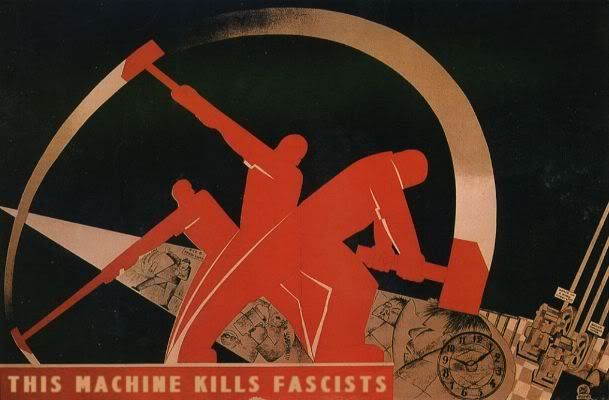The US-Korea Crisis: Setting the Record Straight
Although the current diplomatic crisis between the United States and the Democratic People's Republic of Korea (DPRK) has not produced any dramatic shift in relations between the two countries, it does highlight a sharpening of tensions and a renewed desire on the part of US rulers to replace the North Korean leadership with a regime compatible with their economic, political, and military goals in Asia. George W. Bush's Korea policy is a continuation of the strategy adopted by Washington in the immediate aftermath of the US-Korean War—a policy which seeks to destabilize and isolate the North Korean leadership by imposing economic sanctions, threatening armed intervention, and blocking attempts for a peaceful reconciliation between the two Koreas. The current administration also exploits the public's fear of terrorism to paint the DPRK as a rogue state whose nuclear ambitions must be thwarted before the world is “held hostage to rockets,” as Bush recently claimed. While escalating violence in the Middle East has temporarily taken North Korea out of the media spotlight, the smear campaign against the DPRK has hardly ceased. Fairness & Accuracy In Reporting, the national media watch group, has asserted that “While media dredged up stories of North Korean leader Kim Jong Il's irrationality and eccentricity, coverage left many Americans ill-informed [about] U.S./North Korea relations.” North Korea's leaders are portrayed as madmen bent on provoking a nuclear standoff. It is virtually impossible to find any balanced discussion of their aims that properly contextualizes the situation on the Korean peninsula.
Behind all the muckraking and absurd speculation regarding the North Korean regime is the simple truth that Pyongyang has been remarkably eager to seek a meaningful and lasting peace with the United States. For years it has maintained its desire for bilateral talks with the US. On several occasions North Korea has also reluctantly agreed to engage in six-party talks with the US, Russia, China, South Korea, and Japan, only to be betrayed and humiliated by the US's refusals to ease financial sanctions on the country. In addition, North Korea has been called part of an “axis of evil,” an “outpost of tyranny,” and a “hellish nightmare,” among other epithets. Such a hostile atmosphere, obviously not conducive to any sort of progress towards unification or demilitarization of the Korean peninsula, has pushed the DPRK into a corner where it sees no other choice but to develop weapons necessary to deter a U.S. invasion. As North Korean ambassador to Australia Chon Jae Hong wrote in a letter to Melbourne's Sunday Herald Sun regarding his nation's recent missile tests, “It is a lesson taught by history and a stark reality of international relations, proven by the Iraqi crisis, that the upsetting of the balance of force is bound to create instability and spark even a war.”
It is no surprise that Pyongyang is worried about a potential military conflict with the United States. According to the Washington Post, the United States Strategic Command recently completed the formulation of CONPLAN 8022-02, a contingency plan that includes the use of preemptive nuclear strikes on targets alleged to be developing “weapons of mass destruction.” This July India tested a nuclear-capable missile and the United States itself tested its stockpile of 500 Minuteman-III intercontinental ballistic missiles (ICBMs) on three separate occasions over the past month. None of these tests generated headlines or drew any clamor from the UN Security Council. This double standard simply exacerbates Pyongyang's worries about being regarded as a second-class nation without the right to self-defense. Furthermore, the Pentagon invited every nation involved in the six-party talks except North Korea to oversee its massive Pacific war game known as “Valiant Shield” in June—including North Korea's two strongest allies, China and Russia. This was bound to increase Pyongyang's fears of becoming an international pariah whose closest friends will permit the US to openly threaten war against it.
While many are quick to fault the DPRK for withdrawing from the Nuclear Non-Proliferation Treaty (NPT) in 2003, thus reneging on its commitment towards a nuclear-free Korea, this action came only after a decade of frustration with the United States. Washington refused to uphold its promise under the 1994 Agreed Framework to fund the construction of two light water nuclear reactors and provide the country with much-needed heavy oil in exchange for North Korea's abandonment of its own nuclear program. This led Pyongyang to cite Article X of the NPT which stipulates that “Each Party shall in exercising its national sovereignty have the right to withdraw from the Treaty if it decides that extraordinary events, related to the subject matter of this Treaty, have jeopardized the supreme interests of the country.” That the US is itself in violation of Article VI of the agreement not only for failing to enter “good faith” talks with other nations regarding nuclear disarmament, but also for expanding its nuclear capabilities, further underscores Washington's complete hypocrisy when it comes to nuclear weapons.
Pyongyang is keenly aware that the Pentagon has its sights trained on North Korea and that war with North Korea would fit into a broader US strategy to subjugate Asia. The DPRK has been under immense pressure for two decades, suffering the loss of its preferential trade agreements with the Soviet Union and China in the 1980s, experiencing severe flooding and a subsequent drought between 1995 and 1997 that produced widespread famine, and being denied access to development aid from international financial institutions until it “restructures” its economy according to their neoliberal designs. Yet North Korea knows full well that to accede to US demands would only worsen its current situation. To embrace unconditional unification with South Korea and return to capitalism would likely lead to circumstances similar to what happened to East Germany in 1990, when it was annexed by its western counterpart and coerced into a de-facto colonization that resulted in economic collapse and a rapid disintegration of living standards. North Korea thus maintains its right, fully supported under international law, to develop and maintain a defense program necessary to protect itself from increasingly bellicose threats from the United States, and to ensure that when the unification process moves forward it is not bullied into accepting dictates from either Washington or Seoul.
The North Korean government has made it abundantly clear that it wants a more open and mutually respectful dialogue with the United States. Yet hardliners in Washington refuse even to allow an atmosphere to develop in which such a discourse would be possible. As a first step forward, it is therefore essential that Americans demand that the US military disengage from Korea, pack up its warheads and send home the estimated 35,000 US troops stationed on the peninsula. We must also insist that the US media end the persistent demonization of Pyongyang and be willing to expose Washington's imperial aims throughout Asia and around the globe.



1 Comments:
DPRK has right to make powerful nuclear weapons. Every one in the world know that America is number 1 nuclear state. America has no right to criticise DPRK or other nuclear states.
Post a Comment
<< Home